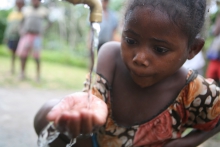Nigerian trade unionists push to stop water privatization

In Nigeria, tens of thousands of people are standing together to protect their water from global corporations. With one voice, they have taken up a call: Our Water, Our Right. They have issued a powerful demand for the Lagos government to reject privatization plans.
On 10 March dozens of Labour and Civil Society groups, including Public Services International (PSI), took to the streets of Lagos to condemn plans by the Lagos State Government and the World Bank to privatise water resources in the state.
The procession proceeded to the office of the Lagos state governor, Raji Babatunde Fashola, where the protesters delivered a joint letter from trade unions and civil society groups, demanding the government to shelf the privatisation and seeking the governor’s swift intervention. The signatories of the letter are Public Services International (PSI), Environmental Rights Action (ERA), Corporate Accountability International (CAI), Amalgamated Union of Public Corporations and the Civil Service Technical and Recreational Services Employees (AUPCTRE).
The planned Public Private Partnership (PPP) is the culmination of a World Bank partnership initiative with the Lagos State government. The project has been widely criticised in Nigeria, with protesters saying the government is using the term Public Private Partnerships in order to privatise the corporation, but that Lagosians will be forced to pay for services they don’t enjoy.
Rosa Pavanelli, PSI General Secretary said, “The World Bank and the bilateral donors must not be allowed to impose their failed privatization conditionalities in Lagos. If they can’t learn the lessons from the failures, then we must keep them out.”
As mentioned in PSI’s report “Why Public-Private Partnerships don’t work”, which contains a combination of 30 years of research and assesses the PPP experience in both industrialised and developing countries, PPPs have failed to live up to their promise. They are often an expensive and inefficient way of financing infrastructure and services, since they conceal public borrowing, while providing long-term state guarantees for profits to private companies.
Lagosians like Akinbode Oluwafemi, Director of ERA, are rejecting the privatization plans that the World Bank has spent decades paving the way for, because they know the disastrous results of other World Bank-backed projects: Rates are hiked, workers are laid off, and families find it harder than ever to access clean, safe water.
The Nigerian unions said, “It is well past time that we got serious about resolving these problems. Access to clean and safe water and sanitation services is the minimum that we demand of our government. Is this really too much to ask? Is it even credible that, in the 21st century, we can’t ensure universal access to water and sanitation?”
That is why the stakes are so high. The World Bank and the global corporations it supports want Lagos to set the precedent for who controls water in Africa. The privatization of Lagos' water will put millions more lives at risk across the continent and we cannot let that happen.
PSI stands with the people in Lagos to defend their human right to water and sanitation, challenges the government to stand up to corporate water privatizers and supports Lagosians in their fight to keep their water in their own hands.
More information here:
- Labour, civil society march against Lagos Govt’s plan to privatize water (Premium Times)
- Workers accuse Lagos of planning to sell water firm (The Nation)
- Don’t Privatise Lagos Water, It’s Inhuman – Groups Tell Fashola (Nigerian Current)
- Lagosians protest against privatisation of water - Photo Gallery (The Cable)
- ERA/FOEN Rally against Water Privatisation in Lagos (This Day Live)
- Planned privatisation of water: Residents, civil societies dare Lagos govt (Vanguard)
- Ambode Petitioned over Lagos Water Privatisation (SpyGhana)
- Lagos to sell off Water Corporation (Prime News)
- Water Day Lagos report (Radio Nigeria)

